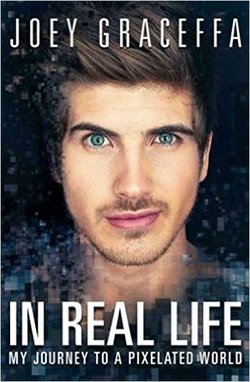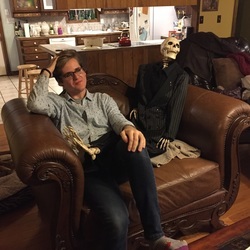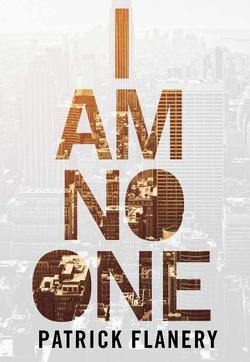Sacred Chickens
Menu
SACRED CHICKENS
 In Real Life by Joey Graceffa Review by Jarad Johnson Joey Graceffa is one of my favorite Youtubers. For those who are unsure of what that is, let me start by saying that the term, “Youtuber,” refers to someone who uploads videos on the social networking site called Youtube. Joey Graceffa makes vlogs, or video blogs, about his daily life (This appears to be an explanation for all of us old people- young people carry on…Julie). It’s sort of like an online diary, in video form. The vlogs are not only entertaining and showcase his bubbly disposition. He is one of the fastest growing personalities on Youtube, with over 6 million subscribers (myself included) on his channel. So you can imagine that I was thrilled to discover that he had written a book. A memoir, specifically. The first thing I wondered was wondered was where he found the time! Over short period of time, he had done the Amazing Race, done a music video, and produced vlogs every day. It turns out the book is like one of his vlogs in written form. It’s written in his characteristic animated style, and his personality definitely shines through just as well in written form. The book begins with memories of his childhood, covering significant and life altering events, such as how he had accidentally eaten lead paint chips at a young age and was later diagnosed with a learning disability. He speaks very candidly and honestly about his struggles with feeling separated and different from the rest of the kids in his school. This, he said, made him very insecure (this shocked me, because he always seems so sure of himself in his vlogs). He also speaks frankly about his mother’s struggles with alcoholism, his unhappiness and seclusion at college, and his risky and ambitious decision to move to Los Angeles with his best friend. At the time, they were both producing content on a channel called WinterSpringPro, which they later left for other venues. His experiences in LA opened a lot of doors for him, especially as far as YouTube was concerned. Overall, the memoir tracks Joey’s journey and growth, both on Youtube and in real life. Told with his typical flair, this inspiring and uplifting memoir showcases his ups and downs, struggles and triumphs so far in his life. As on his channel, his lively persona and positive outlook on life are enough to brighten anyone’s day. Through his book, I feel as if I gotten to know him a bit better. I highly recommend it to not only his fans, but anyone who likes memoirs.  Jarad attends Fayetteville High School, loves tea, and tries to spend every spare second reading. Jarad wants to be an English major. Bless his heart! Let's all light a candle for him and send him happy thoughts!
0 Comments
 I am no one by Patrick Flanery, 2016, Atlantic books Reviewed by Orla McAlinden, finalist in the Greenbean Novel Fair, 2016. The Accidental Wife and other stories, coming summer 2016 www.orlamcalinden.com If, like me, you are often slightly horrified by the detail in which your friends record their lives online, you will find the premise of I am no one, by Patrick Flanery, terrifyingly tantalising. In this post-Snowdon, post-Wikileaks world, Flanery has chosen a fascinating, relevant and important topic to explore in his third novel. I was raised in Northern Ireland, the most heavily policed district of Europe, from the early 1970s to the 90s, and I was delighted to receive I am no one to review — a timely examination of mass State Surveillance and data-mining. All through my childhood I knew people who wouldn’t answer their phones unless you knew the secret morse code of ringtones, I knew people who wouldn’t speak in public places, or who would only speak in public. As Heaney wrote of Northern Ireland at the time, “Whatever you say, say nothing.” On a friend’s wall was a poster that read “Just because you’re paranoid, doesn’t mean they’re not out to get you!” and the protagonist of I am no one appears to be gloriously paranoid. Jeremy O’Keefe is a disappointed academic, banished from Columbia University for a secret misdemeanour that is alluded to throughout the book, but never revealed. His failure to achieve tenure coincides with the end of his marriage and, in retreat, he takes a position at Oxford University, where he spends ten years in exile before returning to New York University, as the book opens. Jeremy descends into paranoia and fear as it becomes apparent that he is being followed and that his online and cellphone activity is being monitored, exploited and even altered. The initial incident is minor — an email sent from his own account to a student, that he has no recollection of writing. Couldn’t he just have forgotten? Is he showing signs of dementia? Has his daughter noticed anything untoward? But within days these questions take on a more sinister tenor — has he been hacked, by whom and to what avail? A mysterious package is hand delivered to his concierge service; could it be a bomb? The tension is high as he gingerly unwraps the first package. No explosions, but a detailed record of every email transaction he has carried out in the past ten years. At this point I still thoroughly expected the story to take off and become the gripping page-turning thriller that the book’s cover and blurb implied. I really, really wanted to love this book. But I couldn’t, try as hard as I might. It’s not so much that Jeremy is an insufferable bore and an elitist snob who behaves badly and I wanted to shake him. I have no problem with unsympathetic, or outright hateful narrators. It’s not the long rambling sentence structure (perfectly constructed as far as grammar goes, I might add) which often encompass three hundred or more words. It’s not the endless, endless flashbacks which appear in the oddest places, sometimes right in the middle of conversations. It’s not even the constant intrusion of the writer, showing us how much cleverer than us he is, and how much he knows on dozens of very interesting topics like the cinematic exploration of totalitarian East Germany, or the philosophy of betrayal. All of these quirks are annoyances, nothing more. Where the book falls is its absolute dishonesty. We spend chapter after chapter on a journey with a man who fears that he is going mad, suffering paranoiacal delusions, even to the extent that he may be suffering from dissociative personality disorder — bugging his own phone and recording his own email correspondence — without conscious knowledge. The other possibility is that he is under surveillance by the state and he knows that is impossible, he has done nothing to deserve this, he wails self-pityingly “I am no one!” It is truly gripping as a reader to accept that in this tech-obsessed world, replete with drones, CCTV, spy cameras, bots trawling through our online communications — any one of us could, in a heart-beat, become the mistaken victim of this kind of horrific government intrusion. In an agonised soliloquy he wonders whether his use of the phrase “I have become radicalised…” in an email almost ten years ago could have been enough to draw him to the attention of the authorities and the reader catches her breath and thinks, wow, I need to be more careful. As the book winds it’s slow and rather dull way to the mid-point we suddenly find out what the reason for his surveillance is. And that’s where the book ended for me, I am afraid. What O’Keefe has done in his final years in Oxford is so stupid, so damaging, so utterly worthy of international alarm bells ringing, that it is immediately obvious that either he knew all along the reason why he was being observed, or he is an utter moron. And one thing that Prof. Jeremy O’Keefe, world-expert on the Stasi, renowned scholar of state surveillance in post-war Europe is not, is a moron. I know that I could have loved this book and learned just as much from it if it had been written as an actual thriller, instead of in its current hectoring, didactic, and inexcusably dull format. What a shame. 3 stars  Orla is an Irish writer, In Summer 2016, Sowilo Press, Philadelphia, will publish her first collection of short stories, The accidental wife, which won the Eludia Award, 2014. Read her story The Visit Read her story Bleeding You can learn more about her at http://orlamcalinden.com/ |

Click Photo above to buy ebook or paperback from Amazon.
Here's the link to Barnes and Noble Or order through your favorite independent bookstore! Categories
All
|
 RSS Feed
RSS Feed